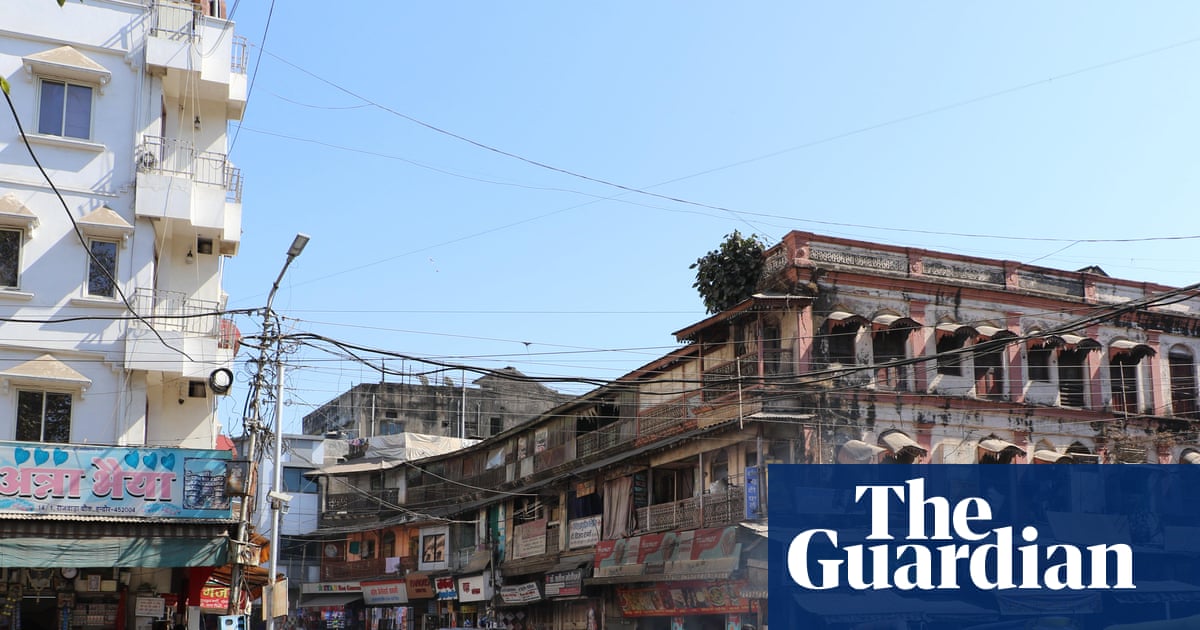By night, Lamine Hanoun works as a hospital guard in Bir Moghrein, near Mauritania’s border with Morocco-occupied Western Sahara. By day, he twiddles his phone, checking TikTok and Facebook, which he uses to sell meteorites to the rest of the world.
In this former French colonial garrison town, network signals come and go like the dusty wind. On a recent morning when the connection disappeared again and the Starlink at the local customs office was unavailable, he drove his silver Mitsubishi GLX to the town’s outskirts.
Sitting cross-legged on a blue tarpaulin sheet under the shade of a leafless gum arabic tree, the 40-year-old Moor tore a page from an old diary to feed a twig fire heating his teapot as he told the story of how he got into the trade.
“I worked for 10 years in construction in Andalusia, but then my aged mother fell sick,” said Hanoun, who is fluent in Spanish, French and Hassaniya, the Mauritanian dialect of Arabic.
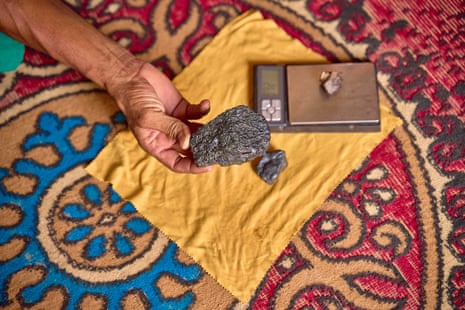
-
Hanoun holds a fragment of debris he says is from Mars
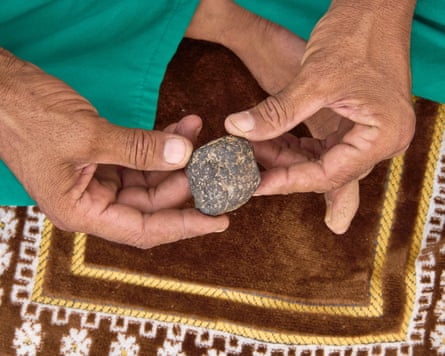

-
Hanoun inspecting items that were brought to him
“So I came back to be a goatherd and one day I started looking for the stones,” he added, as he poured mint tea back and forth between cups to cool it down. Eventually, he sold his goats – to fund his brother’s travel to Spain and to provide for their sick mother – and focused on the meteorite trade.
These days, he mostly waits for meteorite hunters to bring him stones to inspect. If he thinks a stone is valuable, he will haggle over a price then resell it on social media. Occasionally, he ventures into the desert to conduct his own searches. Recently, on one such search, he met Khouna Ould Ahmedou, a 35-year-old goatherd who approached him with a fragment of what he believed was valuable space debris. It turned out not to be.
Brokers and buyers
Though meteorites can fall anywhere on Earth, the Sahara has become a prime area for their discovery, partly because the climate is favourable for their preservation but also because they are relatively easy to spot against the sand.
In the 90s, meteorite hunters and brokers began emerging, but it was not until the 2011 discovery of Tissint, a massive Martian meteorite, in Morocco, that meteor-mania gripped the region.
The Meteoritical Bulletin Database, a global catalogue of approved meteorites, now records more than 300 classified meteorites from Mauritania, making it one of the top African countries. Bir Moghrein features on the list.
In the town, home to only a few thousand inhabitants, the usual interruptions to its daily quiet are the call to prayer or a passing water truck. But beneath the surface lies its history as an informal mining town and a Saharan smuggling gateway.
Officially, 10% of Mauritania’s population is unemployed. But many of those cited in official statistics as employed do poorly paid and insecure informal jobs or seasonal labour. Many people work multiple gigs, especially goatherds, for whom climate change-driven desertification is making survival harder.
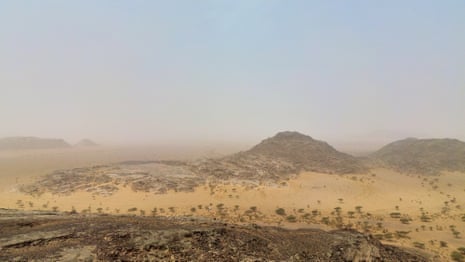
-
The Agnijyatt mountains, 10km (6 miles) from Bir Moghrein.
An eye for a deal is now leading many to take up the meteor trade. Goatherds use their animals as scouts and some hunters lie up at night, patiently waiting for new rocks to drop from the skies. Drivers take their finds across the country, happy to get a percentage of sales. Hanoun’s children, both under 10, sometimes bring him pebbles as gifts, hoping they might be treasures.
On Facebook, there are groups of several dozen enthusiasts from across the Middle East and north Africa who discuss colour, origin and density of the stones from Mauritania. On TikTok, brokers use Arabic classic ballads and multiple hashtags to showcase their catalogue.

-
Khouna Ould Ahmedou is a goatherd but, in his spare time, devotes himself to the search for meteorites
The really precious stones are hard to come by and most of those found around Bir Moghrein are low-value chondrites. Local people tell tales of families who haul 20 litres each of water and fuel into the back of a 4X4 truck, only to return empty-handed days or weeks later from the desert. As the number of finds has declined, some hunters and brokers are turning to yet other gigs.
The brokers say the darker a stone is, the more valuable it probably is. But preoccupation with colour has led to deceit; some brokers now add TikTok filters or wet chondrites to darken them and fool faraway buyers who have to first acquire stones in order to verify them.
Not everyone is a fan of social media brokerage, including Nouakchott-based Mohamed El Amr, the president of the Mauritanian Association of Precious Stones and Meteorites for Protection.
“If people are selling meteorites on TikTok for quick profit, it harms the economy,” he said. “These practices benefit middlemen … meteorites are valuable and rare, and they should not be sold off cheaply through informal channels.”
Across the Sahara, there exists a fragmented desert economy in which hunters sell at low prices to brokers within and beyond their home countries. Eventually, stones end up at multiple times their original sale price with scientists and collectors in far-flung places such as Australia and the US. Hanoun gives an example of a stone weighing 285g that would sell for about €50 in Mauritania, reach double that price in Europe, but go for as much as $1,000 (£740) a gram in the US.
In November 2023, the largest Martian meteorite ever found was discovered in north-west Niger before making its way to a private gallery in Italy. Last month, the 25kg stone fetched $5.3m at an auction in New York, triggering an investigation by authorities in Niamey. In a statement admitting that Niger does not have specific legislation on meteorites, the government cited “possible illicit international trafficking”.
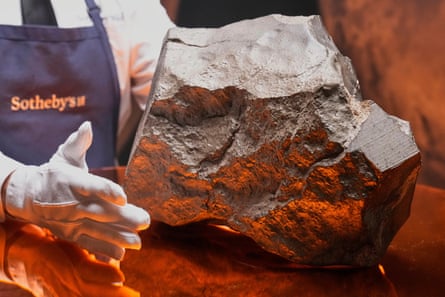
-
A Martian meteorite, weighing 54.388lbs (25kg), said to be the largest piece of Mars on Earth, at Sotheby’s
Currently, Mauritania has no national framework for meteorites, so the trade is entirely unregulated and its scale unknown. Hanoun said he once paid 5,000 ouguiya (£93) for a five-year licence and hasn’t renewed it since, but most hunters and brokers work informally. “They say you need authorisation,” he shrugged. “No one pays.”
In Nouakchott, even government officials know little about the growing sector. “[Finding meteorites] is a niche in the north of the country,” said Sidi Maouloud, a spokesperson for the Investment Promotion Agency of Mauritania. “It’s not really a common trade.”
Back in Bir Moghrein, Hanoun invokes religion in his quest for a big meteorite payday. “You don’t find the meteorite, it finds you,” he said. “It’s a gift from heaven.”

 3 months ago
45
3 months ago
45















